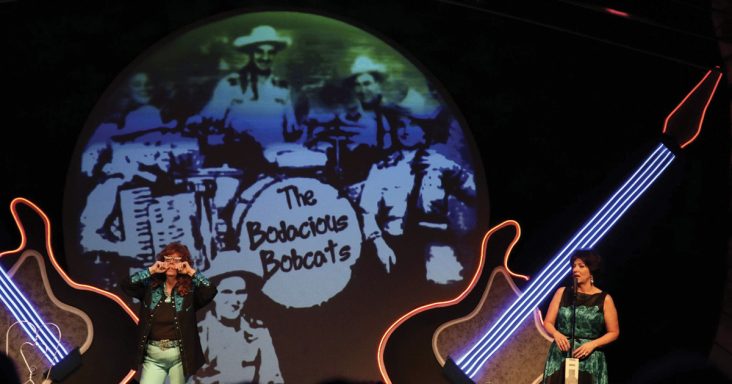Grooms reflects on his years with Downtown Playhouse in Pocahontas
by September 25, 2023 5:45 pm 658 views

When Kelly Grooms drove past the Downtown Playhouse in Pocahontas one night a few weeks ago he noticed several cars in the parking lot. The cast and set design crew were beginning work on the next live theater play, “The Diary of Anne Frank,” which is slated to be unveiled later this fall.
Grooms had a melancholy moment, reminiscing about when he was one of the Playhouse’s founding members, he told Talk Business & Politics. Formed as a nonprofit, the organization was recently transferred to another local nonprofit, Marr Street Productions.
After 41 years working as a director, set designer, actor and jack of all trades for several theater companies in Northeast Arkansas, the 60-year-old said it was time to retire and move onto a new phase in his life. Another longtime fellow thespian, Carol Belford-Lewallen, has also decided to retire, too. Both are considered icons in NEA’s theater scene.
“Well, I’m getting old,” Grooms said with a laugh. “Those ladders started getting heavier and heavier. It made a great deal of sense. It was my decision.”
Each year, the Playhouse puts on three productions. About 3,000 patrons attend the shows each year. Many are from outside of Randolph County, and a contingent of patrons come from Missouri.
A key difference between the Playhouse and other community theaters is focus, Grooms said. Typically, many community theaters are focused on the performers themselves. Grooms said his organization always focused on the audience instead.
In 2014, Grooms along with a few investors decided to buy the old Downtown Playhouse building in downtown Pocahontas. More than a quarter century earlier, he built the stage with his own hands when the building, located near the town’s courthouse square, was The Imperial Dinner Theatre. The Imperial opened a much larger facility and the building went vacant.
Local investors Mike Dunn and Jake Foster approached him about the project. Dunn and Foster wanted it restored to its former glory when it first opened as a movie theater in 1941.
He understood their sentiments, but he had other ideas. He wanted the interior of the theater to look urban grunge, similar to the hollowed store front on Beale Street in Memphis. This theme is popular with younger generations, and he wanted to appeal to them. The walls were covered with dramatic artworks of some of the most famous plays ever, including “Death of a Salesman,” “Les Miserables,” and “The Phantom of the Opera.” His son, Walter, did the artwork.
Audience members sit at candlelit tables and enjoy a beverage and dessert before the show begins. There are several downtown restaurants within walking distance, and the inside of the theater has a Memphis-style blues club feel to it.
The room seats 100 people and it’s arranged in tiers so that before and after the performance and during breaks audience members can easily converse with each other. About $156,000 was raised to buy and renovate the building, but Grooms and many volunteers did virtually all the reconstruction work on their own time, saving an untold amount of money, he said. Almost a third of the costs were tied to a new lighting system. The renovation took more than a year, but the theater opened in July 2015. In homage to Dunn and Foster, two lighted sconces from the original movie theater were placed at the entrance.
During his time in the theater, Grooms has been connected to many different plays but the one that stood out the most to him was “Night Mother.” The play takes place in a rural house and involves only two characters, a mother, Thelma, and her daughter, Jessie. On this evening, Jessie explains to her mother that several changes are about to happen at the house. She retrieves her father’s pistol and tells Thelma she plans to end her life at the end of the evening. Thelma thinks Jessie’s failed marriage, troubled son, difficulties with seizures, and the loss of her father are fueling her suicidal thoughts. Jessie insists that none of that is a factor and she just doesn’t want to live anymore.
The play culminates when Jessie says “night mother” and locks herself in her room. Thelma beats on the door frantically but stops when she hears the gunshot.
“It made you weak-kneed. … The crowd sat in silence. Nobody moved,” he said. “A child killing herself in front of her mother. A lot of people said it was the best play we ever did and many said we should never do a play like that again. It was theater. True theater.”
Marr Street Productions specializes in all types of arts training. The nonprofit offers classes on a variety of dance, drama, music, Taekwondo, and more. Nonprofits obviously can’t be sold like traditional businesses, and Grooms said it’s typical for nonprofits to “transfer” into another one.
The Playhouse will become the Marr Street Playhouse. Grooms said many of the actors and others who volunteered at the Playhouse will still be involved.
Does Grooms think he’ll stay retired?
“It’s a true retirement decision. It was a happy departure. It’s a legacy moment. We need to pass it onto the next generation,” he said.
Reflecting upon what he will miss the most, Grooms said, “The hour or so before the play starts. All the young people are getting the tables ready. The coffee is being poured and the pie is being sliced. Slowly, but surely, the crowd begins to trickle in, and you can hear the dull roar of happy conversation. I love the coffee hour. It’s better than the show.
“That’s what I’m going to miss the most.”
